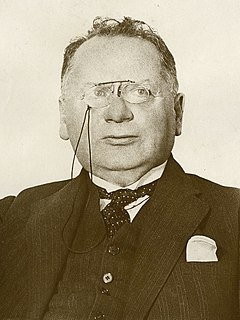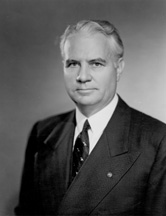Bankruptcy is a legal process through which people or other entities who cannot repay debts to creditors may seek relief from some or all of their debts. In most jurisdictions, bankruptcy is imposed by a court order, often initiated by the debtor.
Abington School District v. Schempp, 374 U.S. 203 (1963), was a United States Supreme Court case in which the Court decided 8–1 in favor of the respondent, Edward Schempp on behalf of his son Ellery Schempp, and declared that school-sponsored Bible reading in public schools in the United States was unconstitutional. The Chief Justice of the Supreme Court during this case was Earl Warren.

Maxim Maximovich Litvinov was a Russian revolutionary and prominent Soviet politician.
In law, receivership is a situation in which an institution or enterprise is held by a receiver—a person "placed in the custodial responsibility for the property of others, including tangible and intangible assets and rights"—especially in cases where a company cannot meet its financial obligations and is said to be insolvent. The receivership remedy is an equitable remedy that emerged in the English chancery courts, where receivers were appointed to protect real property. Receiverships are also a remedy of last resort in litigation involving the conduct of executive agencies that fail to comply with constitutional or statutory obligations to populations that rely on those agencies for their basic human rights.

Masses Publishing Co. v. Patten, 244 F. 535, was a decision by the United States District Court for the Southern District of New York, that addressed advocacy of illegal activity under the First Amendment.
The McCarran–Ferguson Act, 15 U.S.C. §§ 1011-1015, is a United States federal law that exempts the business of insurance from most federal regulation, including federal antitrust laws to a limited extent. The McCarran–Ferguson Act was passed by the 79th Congress in 1945 after the Supreme Court ruled in United States v. South-Eastern Underwriters Association that the federal government could regulate insurance companies under the authority of the Commerce Clause in the U.S. Constitution and that the federal antitrust laws applied to the insurance industry.

The Bricker Amendment is the collective name of a number of slightly different proposed amendments to the United States Constitution considered by the United States Senate in the 1950s. None of these amendments ever passed Congress. Each of them would require explicit congressional approval, especially for executive agreements that did not require the Senate's two thirds approval for treaty. They are named for their sponsor, conservative Republican Senator John W. Bricker of Ohio, who distrusted the exclusive powers of the president to involve America beyond the wishes of Congress.
Assurant, Inc. is a global provider of risk management products and services with headquarters in New York City. Its businesses provide a diverse set of specialty, niche-market insurance products in the property, casualty, extended device protection, and preneed insurance sectors. The company’s three operating segments are Global Housing, Global Lifestyle, and Global Preneed.
Egelhoff v. Egelhoff, 532 U.S. 141 (2001), is a major decision of the Supreme Court of the United States on federalism, specifically with regards to the preemption powers of federal law over state laws. It sets the precedent that any state statutes having a "connection with" ERISA plans are superseded by ERISA, or any future substantially similar law that takes its place. In essence, this decision is a reaffirmation of the right and ability of the federal government to, at least in some instances, pre-empt state laws.
Insurance bad faith is a legal term of art unique to the law of the United States that describes a tort claim that an insured person may have against an insurance company for its bad acts. Under United States law, insurance companies owe a duty of good faith and fair dealing to the persons they insure. This duty is often referred to as the "implied covenant of good faith and fair dealing" which automatically exists by operation of law in every insurance contract.
Paul v. Virginia, 75 U.S. 168 (1869), is a U.S. corporate law decision by the United States Supreme Court. It held that a corporation is not a citizen within the meaning of the Privileges and Immunities Clause. Of greater consequence, the Court further held that "issuing a policy of insurance is not a transaction of commerce," effectively removing the business of insurance beyond the United States Congress's legislative reach.
American Insurance Association v. Garamendi, 539 U.S. 396 (2003), was a case in which the Supreme Court of the United States invalidated a California law that required any insurance company wishing to do business in the state to publish information regarding insurance policies held by persons in Europe from 1920 through 1945.
Chicago Life Insurance Co. v. Needles, 113 U.S. 574 (1885), was a decision by the United States Supreme Court. It involved the writ of error regarding a denial of a motion and final judgment rendered perpetually enjoining Chicago Life Ins. Co. from further prosecution of its business. From that judgment, a writ of error was prosecuted to the supreme court of the state, where, among other things, was assigned for error the refusal of the court of original jurisdiction to adjudge that the said statutes of Illinois were in violation of the Constitution of the United States. The judgment of the inferior court was in all things affirmed by the supreme court of the state, and from that judgment of affirmance the present writ of error is prosecuted.
The Bank of New England Corporation was a regional banking institution based in Boston, Massachusetts, which was seized by the Federal Deposit Insurance Corporation (FDIC) in 1991 as a result of heavy losses in its loan portfolio and was placed into Chapter 7 liquidation. At the time, it was the 33rd largest bank in the United States, and its federal seizure bailout was the second largest on record. At its peak, it had been the 18th largest bank and had over 470 branch offices. The liquidation company was named Recoll Management Corporation and its bankruptcy estate has continued to exist to pay out claims against the company. As of 2016, most of what was once Bank of New England is now part of Bank of America.
Chrysler LLC and twenty-four of its affiliated subsidiaries filed a consolidated petition for bankruptcy on April 30, 2009, with the federal bankruptcy court in New York. The court filing occurred upon failure of the company to come to agreement with its creditors for an outside-of-bankruptcy restructuring plan, by the April 30 deadline mandated by the federal government.
Indiana State Police Pension Trust v. Chrysler LLC was a lawsuit brought in United States federal court June 2009 by several pension funds against Chrysler LLC and the United States Department of the Treasury, to block the planned sale of Chrysler LLC assets to a "New Chrysler" entity in the Chrysler bankruptcy.
New York Life Ins. Co. v. Dunlevy, 241 U.S. 518 (1916), was a decision by the Supreme Court of the United States in which the Court held that a court can exert personal jurisdiction over a nonresident party in an interpleader if that party is served with process while physically present within the state.
United States v. Belmont, 301 U.S. 324 (1937), was a dispute between the federal executive branch and the State of New York over property rights to a deposit from a former Russian corporation with August Belmont & Company, a private New York City banking firm. Belmont established executive predominance over state laws and constitutions in the sphere of foreign policy, and allocated the constitutional power for initiating executive agreements solely to the president of the United States.

The International Life Assurance Society was a 19th-century British insurance company. Its operations in the United States, particularly in the state of Massachusetts, caused it to play a major role in the development of insurance regulation in that country.
State defaults in the United States are instances of states within the United States defaulting on their debt. The last instance of such a default took place during the Great Depression, in 1933, when the state of Arkansas defaulted on its highway bonds, which had long-lasting consequences for the state. Current U.S. bankruptcy law, an area governed by federal law, does not allow a state to file for bankruptcy under the Bankruptcy Code. Certain politicians and scholars have argued that the law should be amended to allow states to file for bankruptcy.




